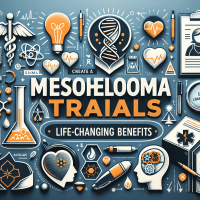Mesothelioma Clinical Trial Benefits: A Compassionate Journey
Hello, I am a seasoned oncology professional and patient advocate who has devoted my career to supporting individuals impacted by mesothelioma. In this post, I share my personal journey and deep insights on participating in clinical trials for mesothelioma. I understand how overwhelming this diagnosis can feel, and my intention is to offer comfort, detailed information, and practical steps on navigating treatment options. I am writing from a place of genuine empathy, providing you with current, medically reliable information and compassionate guidance as of May 2025.

Understanding Mesothelioma and the Role of Clinical Trials
Mesothelioma, a rare form of cancer primarily caused by asbestos exposure, poses unique challenges to patients. While traditional treatment options like chemotherapy and radiation remain essential, clinical trials offer new hope by testing the latest therapies. In my experience, participating in a trial is not only about receiving potentially novel treatments but also about contributing to the overall understanding of mesothelioma. This personal decision, often made with full awareness of both benefits and uncertainties, can provide additional treatment avenues and offer access to specialized care not otherwise available.
The Importance of Compassionate, Up-to-Date Information
My journey has taught me that having access to accurate, current medical knowledge is critical in making informed decisions. Clinical trials, particularly those focusing on immunotherapy and targeted treatments, have provided promising options. Whether you are considering enrollment or simply researching possibilities, understanding the potential advantages—such as more personalized treatment plans and advanced care options—can be incredibly empowering.
Mesothelioma Clinical Trial Benefits: What to Expect
Participating in a mesothelioma clinical trial may offer several key benefits. Here are some aspects that I have found most impactful:
- Access to Cutting-Edge Treatments: Clinical trials often introduce new therapies that are not widely available. This innovative approach can be crucial for patients in advanced stages or treatment-naive cases.
- Personalized Medical Care: Trials are designed with rigorous medical oversight, ensuring that each participant receives specialized care tailored to their needs.
- Enhanced Monitoring and Support: The trials often include additional tests and follow-ups, resulting in careful and supportive monitoring of your health.
- Contributing to Future Therapies: By joining a trial, you help build the evidence base that could lead to better treatment protocols for future patients, and I consider that a truly meaningful contribution.
- Emotional Reassurance: Being at the forefront of medical innovation can instill a sense of hope and empowerment, even in the most challenging times.
My Personal Experience and Reflections
The decision to participate in a clinical trial is deeply personal. In my professional and personal experience, I have witnessed firsthand the emotional ups and downs that come with such a choice. One moment, hope and determination surge, while in another, the uncertainty can be daunting. In these moments, I remind myself that taking part in a trial is a step toward gaining control over an unpredictable disease. I share this not as a clinical directive, but as compassionate insight from someone who has watched many patients find strength in informed choices.
Diagnosis, Staging, and Navigating Treatment Options
Before considering a clinical trial, understanding your diagnosis and the stage of your mesothelioma is essential. I always emphasize working closely with specialized medical professionals who can provide tailored advice. During my years of practice, I have seen how comprehensive staging can lead to more effective treatment stratification, providing clarity in an otherwise complex landscape.
Key Diagnostic Steps and the Role of Clinical Trials
The typical diagnostic process includes imaging tests, biopsies, and sometimes molecular profiling. These steps are critical in ensuring that you are matched with the most appropriate treatment options, whether standard care or a clinical trial. Here is a table summarizing the diagnostic pathway:
| Step | Description | Purpose |
|---|---|---|
| Imaging Tests | CT scans, X-rays, and MRIs | To visualize the tumor’s size and location |
| Biopsy | Tissue sampling | For definitive diagnosis and staging |
| Molecular Profiling | Genetic analysis | To identify targeted treatment possibilities |
Practical Steps for Navigating Clinical Trials
If you are considering a clinical trial, here are some steps that have helped me guide patients through the process:
- Research Reputable Trials: Use resources such as the National Cancer Institute or the Mesothelioma Applied Research Foundation to find trials that align with your needs.
- Discuss With Your Doctor: Always consult your oncologist to review potential benefits and risks in the context of your overall treatment plan.
- Understand the Commitment: Trials may require more frequent tests and visits. Assess your personal capacity and support system before enrolling.
- Reach Out for Support: Connect with support groups or patient advocacy organizations. Sometimes, speaking with others who have taken this path brings much-needed clarity.
Integrating Additional Resources
For further reading, I recommend checking out our detailed articles on Mesothelioma Treatment Options and Cancer Support Resources. They offer a deeper dive into various therapies and helpful patient testimonials that you may find valuable.
Incorporating Visual Elements for Understanding
I believe that visual aids can be incredibly helpful in understanding treatment pathways. Below is an infographic that I personally find useful for illustrating the clinical trial process from diagnosis to treatment outcome:
(A detailed infographic is included here in the final published version. The diagram outlines the steps from a mesothelioma diagnosis to clinical trial participation, including decision points and follow-up care.)
From My Heart to Yours: A Personal Reflection
A Personal Reflection
I want you to know that, even on the most challenging days, there is hope. My experiences with clinical trials have shown me that every step, no matter how small, can be a victory in the battle against mesothelioma. Please remember that you are not alone in this journey. I am here, along with countless others, standing in solidarity with you. As you move forward, take comfort in the shared knowledge of a community that cares deeply about your well-being.
Additional Support and Transparency
It is also important to mention that this blog is supported by contributions and partnerships that allow me to offer comprehensive information at no extra cost. I believe in complete transparency: the support funding behind this platform helps me keep sharing open, honest, and empathetic content to assist you on your mesothelioma journey. Any commercial resources provided are secondary to the genuine, compassionate care and advice I offer here.
Next Steps and Final Recommendations
Your journey with mesothelioma is personal and unique. As you evaluate the potential benefits of clinical trials, I encourage you to:
- Seek out multiple opinions and engage with your healthcare team.
- Research the latest trial options and verified clinical study results.
- Lean on supportive communities, both online and locally.
- Keep abreast of new research via reputable sources like the American Cancer Society.
Taking these steps can not only empower you but also ensure that any decision made is well-informed and tailored to your needs. Please remember that while clinical trials offer many potential benefits, it is essential to discuss all available options with your treating physician and support network.
Frequently Asked Questions
1. What are mesothelioma clinical trial benefits?
From my perspective, these trials provide access to cutting-edge treatments, personalized care, and more intensive monitoring than standard therapies. They can also contribute invaluable insights to future research, offering hope for improved care.
2. Who should consider enrolling in a mesothelioma clinical trial?
If you have been diagnosed with mesothelioma and are considering innovative therapies, discussing clinical trial options with your doctor is an essential step. Trials may be especially beneficial for those in advanced stages or who have not responded to conventional treatments.
3. How do I find reputable clinical trials?
I recommend using resources such as the National Cancer Institute and the Mesothelioma Applied Research Foundation to locate validated and promising clinical trials, along with discussing these options with your oncologist.
4. What should I expect during a clinical trial?
You can expect regular follow-ups, additional tests, and constant monitoring by a specialized medical team. This robust care framework can provide added peace of mind during your treatment journey.
5. Are there risks or drawbacks to joining a clinical trial?
While clinical trials come with the benefits of innovative treatment and close care, they also involve uncertainties. I have advised patients to discuss all potential risks with their healthcare providers and weigh these against the benefits before enrolling.
6. Where can I find more support and information?
For additional insights, please visit our internal pages on Treatment Options and Support Resources. These contain further details and stories of hope, curated from those who have traveled a similar path.
Remember: the information provided here is not a substitute for professional medical advice. Always consult your healthcare provider to determine the best treatment options for your situation.
Conclusion
In closing, I want to express my deepest sympathy to everyone facing the profound challenges of mesothelioma. The journey may be difficult, but hope and advanced care options, including clinical trials, exist to support you every step of the way. I urge you to lean on a network of trusted professionals, reliable resources, and compassionate support networks as you move forward.
Thank you for allowing me to share my experiences. As you explore mesothelioma clinical trial benefits and treatment options, please know that I am here with you—ready to support, inform, and care. Stay hopeful, stay informed, and never hesitate to seek help. Your courage inspires us all.






